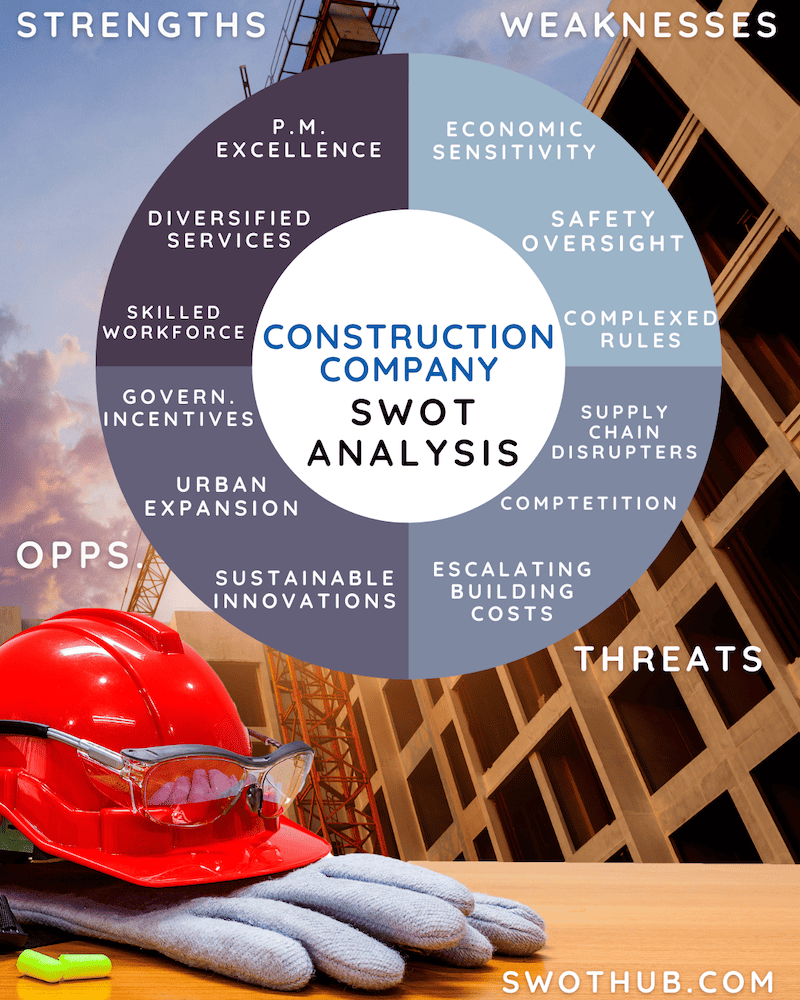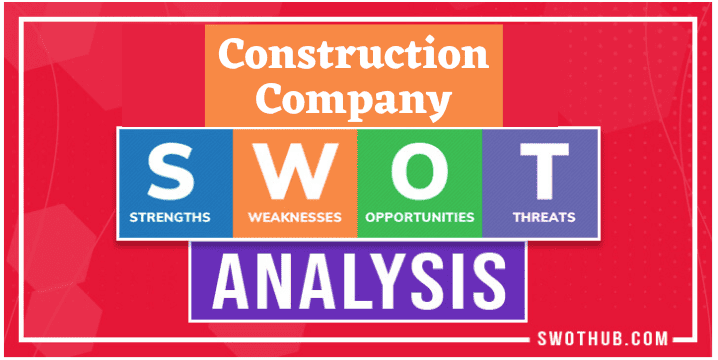The appeal of running a construction company lies in creating structures that shape communities. Successful projects, like residential or commercial developments, showcase both creative and financial rewards. A construction company SWOT analysis helps identify success factors and potential pitfalls. The industry’s history reflects innovation alongside challenges like project complications. If you’re considering entering this field, explore its strengths, weaknesses, opportunities, and threats.
If you’re an architect, stakeholder, or engineer, take a look at our Architectural SWOT Analysis for Site selection here for related insights into evaluating locations and their impact on construction outcomes, offering a complementary perspective to construction company strategies.
Table of Contents
History of the Construction Company Industry
Historically, owning a construction company has been a pathway to financial success through creating physical foundations. However, issues like budget overruns and regulatory complexities emphasize the need for strategic thinking. A comprehensive construction company SWOT analysis provides the understanding needed to navigate these challenges effectively.
Construction Company SWOT Analysis:
Uncovering the layers of a construction company SWOT analysis shows a strategy for success in this domain. This strategic assessment has the potential to provide useful information to builders, developers, architects, and general contractors.
Construction Company SWOT Analysis Strengths:
Strengths define what sets a company apart. Key strengths identified in a construction company SWOT analysis include:
- Technical Advantage: Leveraging innovations like Building Information Modeling (BIM) improves accuracy and reduces rework, giving a competitive edge.
- Expertise and Skilled Workforce: A company’s value lies in its talented architects, engineers, and craftsmen who deliver high-quality results.
- Service Diversification: Offering residential, commercial, and infrastructure services helps broaden revenue streams and reduces market dependency.
- Excellence in Project Management: Effective management ensures timely delivery, cost control, and stakeholder satisfaction.
Company SWOT Analysis Weaknesses:
The weaknesses of an industry are those that limit its potential, make it less competitive, and prevent it from achieving its goals. In a SWOT analysis of a construction company we will look at some of their weaknesses compared to competitors, including:
- Safety Oversight: Insufficient safety measures risk accidents and legal liabilities. Hiring dedicated safety officers is crucial.
- Economic Sensitivity: The industry’s dependence on economic cycles makes it vulnerable to downturns.
- Skilled Worker Shortages: A lack of qualified labor disrupts timelines, increases costs, and hampers growth potential.
- Regulatory Complexity: Navigating regulations and securing permits often causes delays and additional expenses.

Construction Company SWOT Analysis Opportunities:
Seizing opportunities can propel a construction business forward. Opportunities highlighted in a construction company SWOT analysis include:
- Urban Expansion: Growing urbanization drives demand for new residential and commercial developments.
- Sustainable Innovations: The rise of green building and LEED-certified projects offers significant growth potential.
- Technology Integration: Implementing IoT, automation, and advanced software enhances efficiency and decision-making.
- Infrastructure Development: Government investments in infrastructure projects provide lucrative opportunities.
SWOT Analysis of a Construction Company Threats:
Supply chain disruptions and escalating costs pose immediate threats to profitability and stability. A construction company SWOT analysis identifies these key threats:
- Cybersecurity Risks: Advancing technology brings vulnerabilities, making data protection essential.
- Supply Chain Disruptions: Global events and material shortages can delay projects and increase costs.
- Escalating Costs: Rising material and labor costs can erode profit margins.
- Competitive Landscape: Differentiation through quality and innovation is crucial in a crowded market.
Who are the construction company’s competitors?
In the fast-paced world of building, rivals appear from all directions, each fighting for a piece of the pie. To flourish in this volatile environment, construction companies must not only identify their competitors but also execute methods to protect their business. Let’s take a look at the competition and see how you can strengthen your building business.
- Other local construction companies: Direct local competitors frequently share target markets and projects. To leverage your unique offerings, analyze their strengths and limitations.
- National and international players: Large-scale construction firms with a larger geographic reach may pose a danger. To counteract their impact, use your agility and local knowledge.
- Specialized niche construction companies: Competitors specializing in certain areas, such as sustainable building or historic repairs, might carve out their own market share.
- Integrated Real Estate Developers: Companies that manage the full development process, including design, building, and property management, may compete.
Construction Company SWOT Analysis – Conclusion and Recommendations:
Entering the construction industry necessitates a thorough understanding of its SWOT dynamics. While obstacles abound, opportunity abounds for those who navigate them strategically. The construction canvas awaits, promising to shape skylines and communities while welcoming tomorrow’s imaginative builders.
- Embrace technology: Use construction technology to streamline procedures and improve project management.
- Skills Investment: To combat labor shortages, cultivate a skilled workforce via training and development.
- Entering the construction industry requires a strategic understanding of SWOT dynamics. While challenges exist, opportunities abound for those who navigate them effectively. A thorough construction company SWOT analysis offers actionable insights to build a resilient and successful business.
- Embrace Technology: Use advanced tools to streamline operations and improve outcomes.
- Invest in Skills: Address labor shortages by prioritizing workforce training and development.
- Diversify Projects: Balance your portfolio with varied project types to minimize risk.
- Mitigate Risks: Proactively address potential challenges to ensure project success.
- The construction industry offers the chance to shape skylines and communities. Armed with a thorough construction company SWOT analysis, you can confidently build a lasting legacy by leveraging strengths like skilled labor and technical innovations, addressing weaknesses such as regulatory challenges, seizing opportunities in sustainable construction, and mitigating risks like rising costs and supply chain disruptions.Diversified Portfolio: Balance project types to lessen company risk and alleviate economic swings.
- Risk Mitigation: Identify and manage any risks ahead of time to ensure project timelines and budgets are met.
The construction industry offers the chance to shape skylines and communities. Armed with a thorough construction company SWOT analysis, you can confidently build a lasting legacy by leveraging strengths like skilled labor and technical innovations, addressing weaknesses such as regulatory challenges, seizing opportunities in sustainable construction, and mitigating risks like rising costs and supply chain disruptions.
FAQs for the Construction Company Industry:
Is running a construction business profitable?
Yes, running a construction business can be profitable, but success depends on factors like effective project management, accurate cost estimation, market demand, and competitive pricing. It requires a strategic approach, quality execution, and adapting to industry trends.
What type of construction business is most profitable?
The profitability of a construction business varies based on factors such as location, market demand, and expertise. Residential, commercial, and infrastructure projects each have their own potential for profit. Specializing in niches like luxury homes, green construction, or renovations can also yield high returns.
Which contractor makes the most money?
The earning potential of contractors varies widely. General contractors overseeing large-scale projects can earn substantial profits, while specialized contractors like electrical, plumbing, or HVAC experts also have lucrative opportunities. Success depends on skill, reputation, project complexity, and effective management.





